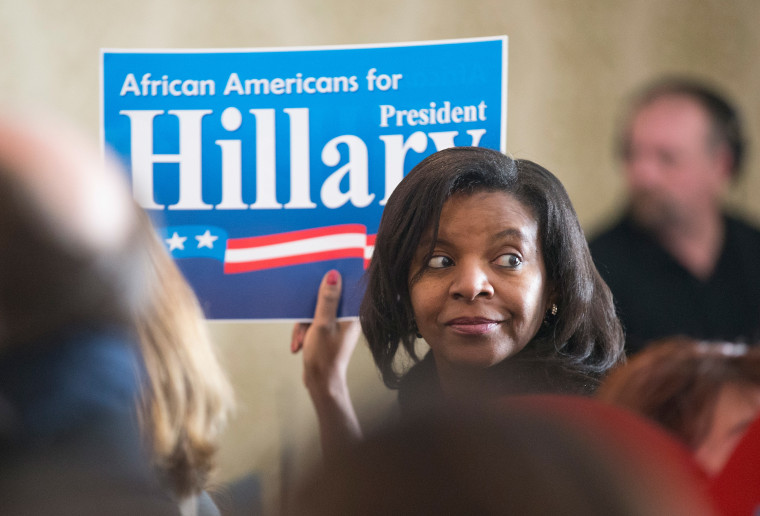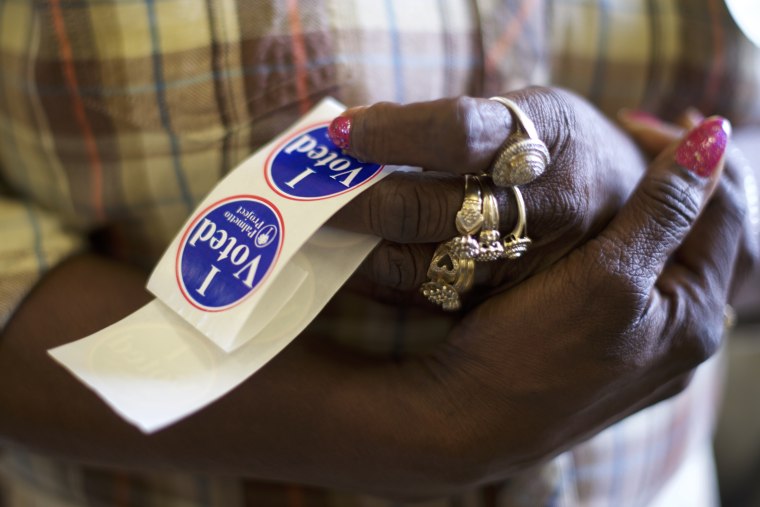This past June I was at a workshop at Yale where a young, white feminist asked me if I was as excited about Hillary Rodham Clinton snagging the Democratic nomination as she was. My answer was a matter of fact, “no, not excited.”
While there is historical significance for women, many black women haven’t been able to tease out what it means for us.
Later, I talked to group of young black women who all are very socially engaged and civically astute. Some were not even old enough to vote when candidate Barack Obama ran the first time, so they don’t carry the same skepticism about candidate Clinton that many more seasoned, black women voters have.
At the time, they said that they were not engaged around Clinton, either. But they all agreed they would vote for her because they worried about what it would mean for them and the issues they care about if her opponent, Donald Trump won. They didn’t view him as a viable option.
They gambled with black voters and lost the nomination. Black women didn’t forget. But what will they do about it?
This wouldn’t be the first time that candidates at the local, state and national levels slid into office because voters picked the person they saw as the lesser of two evils. After the heated campaigns up to now, and the Republican Convention, it seems that Clinton may be viewed as the best choice for black women voters, whether she has earned it or not. And that may be just enough to get her to the White House.
On Monday night, First Lady Michelle Obama took the stage at the Democratic Convention to help set the tone for the week and make the case for Hillary Clinton, confidently declaring, "I'm with her."
Just after Clinton clinched the nomination in early June, that same "I'm with her" proclamation was subverted to #GuessImWithHer in the Twitterverse, with some in the black community displaying their reluctance and ambivalence by way of meme.
After this week's political pep rally concludes do Clinton and her newly announced running mate, Tim Kaine, really need the excitement and engagement from black women voters? And what does she need to do to get it?
History says Democrats get more than 90 percent of the black vote in presidential elections. Yet there may be a real disconnect between party loyalty and being excited and engaged in this particular election.
There is no question that Clinton carries some baggage with black voters that goes back to 2008. She came into that campaign as the presumptive shoo-in against candidate Barack Obama. Her team took the black vote for granted. And it created a big rift between the black leaders in this country, many of whom owed a big debt to the Clintons and were asked to pay up.
As Vernon Jordan has said, “You want to leave with the one who brought you.” The Clintons brought him — and many other black leaders — to the insider table.
RELATED: Does the Party of Obama Still Not Understand the Rise of Brown Voters?
Much of Clinton's primary campaign rhetoric not only seemed unnecessarily barbed at her opponent, but her campaign’s comments were peppered with racial innuendo and white privilege. While aimed at candidate Obama, they felt like fastballs hurled at black America. Were they directly racist? No. But it appeared they would do and say anything to win. They gambled with black voters and lost the nomination. Black women didn’t forget. But what will they do about it?
An ever-shifting political demographic says that there are certain audiences you must engage and capture if you want to be president of the United States. You need young people. And if you are a Democrat, you need black and Latino America. Both parties need women of all races and ethnicities to win.

A recent NBC News/Marist poll showed that in the primaries, Trump drew zero percent of black voters in Ohio and Pennsylvania during the primaries. No presidential candidate has ever won the White House without winning those states in the general election.
The stakes are high for Clinton. But they are as high for black women voters. The Black Women’s Roundtable produced a powerful report, Black Women in the U.S. 2015, which lays out the facts. According to the report, black women are more likely to be poor than our white counterparts. Black women suffer from the highest maternal and infant mortality rates. We are more than three times as likely to be murdered as our white counterparts. Black families are caught up in the criminal justice and social justice systems. And yet we are a major voting group.
RELATED: 'Black Men For Bernie' Supporters Rally in Philadelphia
The black voters have the potential to impact the policies that determine the way our children are educated, how safe their communities are, and how equity in health and health care is distributed. But how can women of color, especially black women leverage and harness their political clout best, when there are no real alternatives? This year, even though we are living with a certain amount of apathy about our choices, black women have the opportunity to understand and use their formidable voting power to impact dialogue and change on the key policy issues that matter to them, their families and their communities.
There is a hard reality for black women voters. No matter how we feel about Hillary Clinton and her campaign, we either vote for her, or stay home. There is no sign that women of color will switch parties anytime soon. And we do not stay home... But we remember what sizzling excitement feels like. We had that in 2008.
Will black women simply fall in formation, or insist on being heard? Clinton may have gotten an energizing bump from the topsy-turvy Republican Convention but can she sustain it?
Maybe next week the Clinton campaign can begin to figure out how to harness some of the Black Girl Magic. Will black women show up, even if we don’t show out like we did in 2008? Only time will tell.
